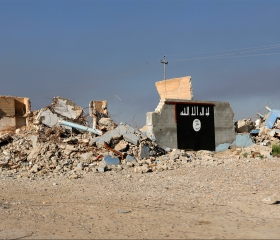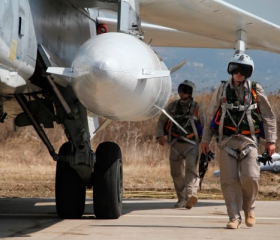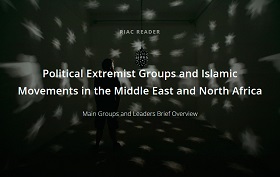The terrorist attacks in Paris on November 13, 2015 gave a new impetus to the international fight against Islamic terrorism. However, the initial optimism and hopes that a single broad coalition against Islamic State would be formed have not come true. Even the French President François Hollande, who staked his reputation and his chances of being elected for a second term on the fight against terror, failed to persuade the Russian and U.S. presidents to start a joint campaign against Islamic State because of their differences over the future of Syrian President Bashar al-Assad.
The terrorist attacks in Paris on November 13, 2015 gave a new impetus to the international fight against Islamic terrorism. However, the initial optimism and hopes that a single broad coalition against Islamic State (lately also referred to as DAISH, the Arabic acronym for the Islamic State of Iraq and Levant) would be formed have not come true. Even the French President François Hollande, who staked his reputation and his chances of being elected for a second term on the fight against terror, failed to persuade the Russian and U.S. presidents to start a joint campaign against Islamic State because of their differences over the future of Syrian President Bashar al-Assad. What is more, the issue of creating a broad coalition was effectively closed on the morning of November 24, 2015, when a Turkish Air Force F-16 fighter plane shot down a Russian Su-24 bomber that had allegedly violated Turkish airspace. The sharp deterioration of relations between Moscow and Ankara, in addition to fresh tensions with NATO, whose member countries were to be the core of a new anti-terrorist coalition against Islamic State, merely fuelled mistrust among the potential partners.
Against the background of the counter-terrorist operation in Syria and Iraq against Islamic State – arguably the main current threat to international security – regional and local Islamist terrorist groups are becoming more active. Thus, on November 20, 2015, militants from the previously little-known Al-Mourabitoun group broke into Radisson Blue Hotel in the Mali capital Bamako and took about 170 hostages, including European and Russian citizens. The terrorists then released several hostages who were able to quote passages from the Quran. After the Mali police stormed the hotel, it was revealed that the terrorists had killed 19 of the hostages, including six Russian Volga-Dnepr Airlines crew members, who had delivered a Norwegian cargo for the UN Multidimensional Integrated Stabilization Mission in Mali (MINUSMA) to Bamako on an An-124 plane. Seven hostages were wounded.
The attack puts the issue of local terrorist groups, many of which openly sympathize with Islamic State and are ready to fight to build the Caliphate in their country, on the international security agenda. It also raises questions as to how – and with whose help – the militants managed to drive in a vehicle with diplomatic license plates into a protected part in the Mali capital.
Systemic Flaws of the Anti-Terrorist Strategy
The initial target of international efforts in the global counter-terrorist operation from the autumn of 2001 was al-Qaeda, the terrorist network which, by claiming responsibility for the 9/11 attacks, challenged the world’s most powerful country – the United States. As a result of resolute and coordinated actions of the world community, as well as successful U.S. military operations, al-Qaeda was essentially forced underground. Al-Qaeda’s strategy, which was limited in scope to carrying out strikes against the United States in order to force it to stop backing corrupt regimes in the Muslim countries did not work. Washington was determined to quash any challenge to its power and global leadership, be it from a state or non-state actor in international relations. No one can play on an equal footing with the United States for an extended amount of time, even if an asymmetric strategy is employed.
By the mid-2000s, local Islamic terrorist organizations had emerged. These organizations set themselves less ambitious tasks – to topple their own governments and establish a truly Islamic form of government. One such organization was Al-Qaeda in the Islamic Maghreb (AQIM), which had previously gone by the name of the Salafist Group for Preaching and Combat, founded in 1997. Its core is made up mostly of Algerians, a country where Islamist sentiments have been strong since the early 1990s. In 2006, the Salafist Group for Preaching and Combat took an oath of allegiance to al-Qaeda, using its brand to carry out terrorist activities.
The Arab Spring served as an additional catalyst for terrorist activities in North Africa. The most tragic part of the Arab Spring was probably the civil war in Libya, which even after the Western-backed toppling of Muammar Gaddafi is still unable to find political equilibrium within the country, and which is mired in local conflict and inter-clan quarrels.
The Libyan war practically deregulated the entire system of relations in North Africa, exposing previously latent conflicts and removing any barriers to the spread of small arms across the borders. One manifestation of the changed balance of forces was the Tuareg Rebellion in 2012–2013 in the northeast of Mali, which resulted in half of the country coming under the control of rebels who wanted to create their own state, Mali Azawad. The military coup in Mali in March 2012 as a reaction to President Amadou Touré’s supposedly inept handling of the situation further aggravated matters and played into the hands of the Tuaregs. The Tuaregs were gaining territory with astonishing speed. There was a real threat that the central government would fall. It was at this point that France, the former colonial leader, stepped in. Operation Serval was carried out in January–February 2013 (officially it was completed in July 2014) and quickly defeated the Tuaregs, who by then were already in conflict with the Islamists. Among them was AQIM, which wanted to create a Caliphate in northern Mali. France then turned over the peacekeeping mission to the United Nations. Today MINUSMA has a staff of 11,500.
Prototype of the New Islamic Threat
The Islamist group Al-Mourabitoun, which claimed responsibility for the latest terrorist attack in Bamako, was formed in early 2013 on the basis of two breakaway factions of AQIM and other Islamist groups. Most of their members are Algerians and Tunisians and their declared targets include French commercial interests and diplomatic missions in Algeria, Mali, Mauritania and Niger, as well as international peacekeeping forces in Mali. In 2013–2015, the group staged attacks in Niger (at a military base and a uranium mine), Niger (at a pre-trial detention centre), Algeria (at a gas production facility) and Mali (at a night club and a hotel). So far, the attack on the hotel in Bamako has had the biggest resonance.
Al-Mourabitoun does not have clearly stated internal political demands. However, judging from its actions, it seeks to wreck Algerian agreements between the government and the Tuaregs, destabilize the already volatile situation in Mali ahead of the elections in the hope of plunging the country into chaos, and organize a Caliphate on the territory under its control. It is still unclear whether the group is affiliated with al-Qaeda or Islamic State. In May 2015, Al-Mourabitoun allegedly pledged allegiance to Islamic State, although the reports were later denied. Perhaps the terrorist attack in Bamako was meant as a reminder of al-Qaeda’s existence, as opposed to Islamic State.
One thing is clear: groups such as Al-Mourabitoun can pose a serious threat to the security of individual Muslim countries and entire regions. Alas, this can happen in many countries with a weak central government.
Besides, it is obvious that Islamic State in its present shape is not viable in the long term. Having challenged Western countries, it has doomed itself to defeat – just as al-Qaeda did in its time. However, there are now between 30,000 and 35,000 foreign fighters in Islamic State who will return to their countries and try to continue to fight their own governments as part of small Islamist groups. That is why the spread of the Islamic threat and the growing number of local terrorist groups may become a new serious threat to peace and security in the near future.
To Change History
First in Afghanistan and now in Syria and Iraq, the world community is trying to extinguish the most obvious and serious manifestations of Islamism. However, very little has been done to effectively counter Islamist ideology and the vision of statehood (Caliphate). Military strikes can destroy the Islamists’ infrastructure and their command links, but they cannot destroy their ideas which, alas, are spreading around the world. Even if the visible manifestations of the Islamic threat can be suppressed, and Syria and Iraq are cleared of militants in a land operation and central government there is restored, no one can guarantee that the next Islamic state will not spring up –in Nigeria, for example, where the Boko Haram radical Islamist group has pledged allegiance to Islamic State; or in Afghanistan and Pakistan, where the Taliban is still strong. Unfortunately, this is a fairly realistic scenario.
Ideas can be proved to be untenable only in contest with other ideas. Thus, the liberal-democratic model, which has proved to be stronger than the communist model, is not making much headway in the East for a number of objective reasons. We need to devise a state system for the Muslim world that would meet the canons of the Islamic religion and permit Muslim countries to develop successfully in the modern global world. The issue has become sufficiently important, because the alternative to such a state system may turn out to be the spread of the local terrorist threat to various parts of the world, making the fight against it that much more difficult.







